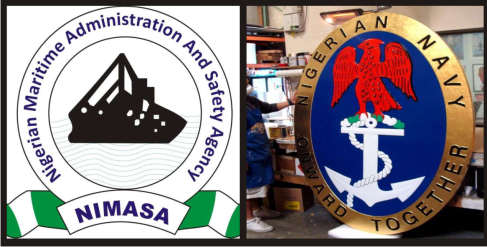The Nigerian Maritime Administration and Safety Agency (NIMASA), says plans to harmonise the organisation’s training procedures with those of the Nigerian Navy are at an advanced stage.
Dr Bashir Jamoh, the Director-General of the agency disclosed this when he hosted the Flag Officer Commanding (FOC), Naval Training Command (NAVTRAC), Rear Adm. Fredrick Ogu, at the agency’s headquarters.
A statement signed by Mr Phillip Kyanet, the Head, Corporate Communications, NIMASA, made available to newsmen, disclosed this on Sunday in Lagos.
Jamoh said that the harmonisation of training procedure was for improved safety and security of the country’s maritime space
The director general said that a large chunk of the agency’s budget went into the training of its workforce, from which other stakeholders, including the Nigerian Navy, also benefited.
He said NIMASA would look in the direction of naval facilities and how to harmonise the training guidelines to meet the standards required by the International Maritime Organisation (IMO) for certification.
“NIMASA invests so much in the training of her workforce, and aside that, we have what we call non-staff educational assistance, which is also geared towards building capacity for the maritime sector, apart from our workforce.
“This, we have also done by including navy personnel whenever the opportunity and the need arise.
“In this wise, we are open to approval of training facilities across the country as long as they meet IMO’s training standards,” he said.
Jamoh said that NIMASA was not an armed organisation and could not achieve its mandate without the Nigerian Navy.
He noted that the Navy/NIMASA relationship had come a long way, and predated the Memorandum of Understanding (MoU) that birthed the Maritime Guard Command, manned by naval officers and domiciled in the agency.
The director-general said the Deep Blue Project, also known as the Integrated National Security and Waterways Protection Infrastructure, aimed at comprehensively tackling insecurity on Nigeria’s territorial waters.
He said that it would also tackle insecurity at the Exclusive Economic Zone, up to the Gulf of Guinea.
“Most of our Deep Blue Project assets are already in the country and most of these assets, like the Special Mission Vessels and aircraft, would be manned and commanded by the officers of the Nigerian Navy.
“What is causing a little delay in the deployment is the training component because some of these trainings will be done outside the shores of the country, and because of the COVID-19 pandemic there is a little delay in the training programme,” he said.
Earlier in his comments, Ogu, who was appointed FOC, Naval Training Command in June, reiterated the need for NIMASA and the Navy to work together closely, in training and on other fronts.
He emphasised NIMASA’s role in the certification of most maritime-related training programmes.
“I know we have an existing MoU with NIMASA, which makes it easier for us to relate on many fronts, and the importance of NIMASA to our trainings cannot be overstated.
“They are the ones who issue certificates for our basic mandatory and survival at sea trainings. So there is need for us to harmonise our training methods to further enhance our capacity,” he said.
The FOC also disclosed that the Navy had training facilities that were available to both civilians and military personnel.
He urged Nigerians willing to take up a career in the maritime sector to take advantage of the naval facilities across the country.(NAN)














